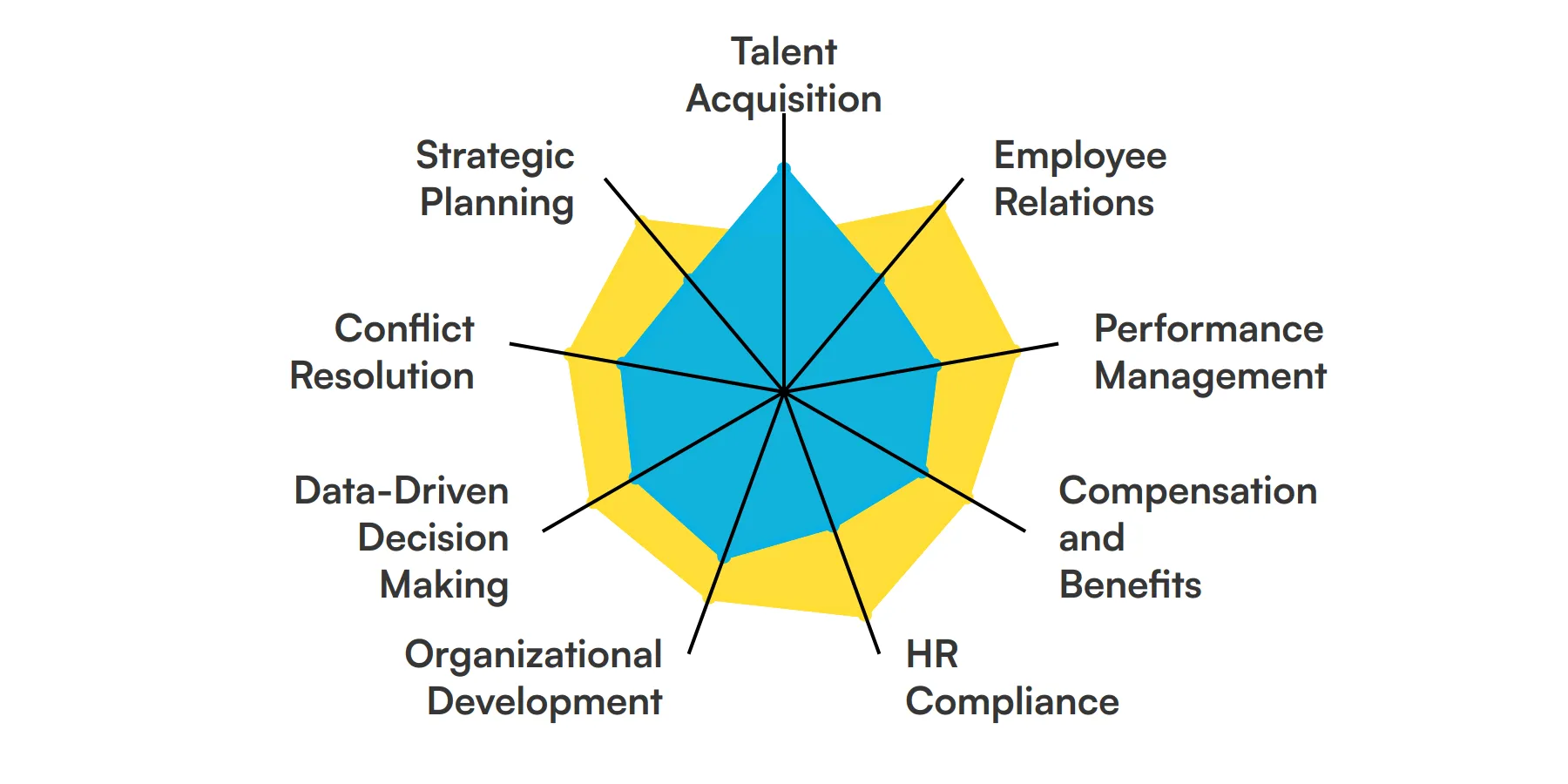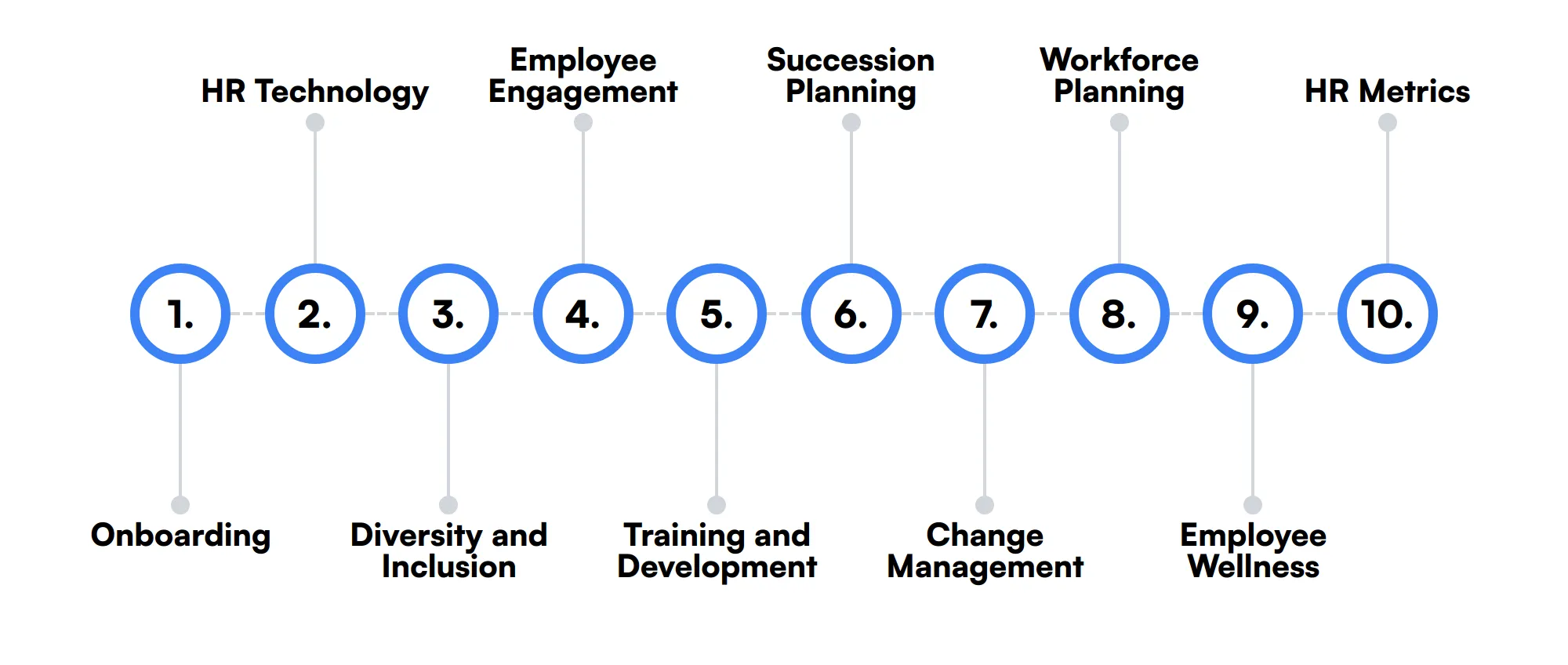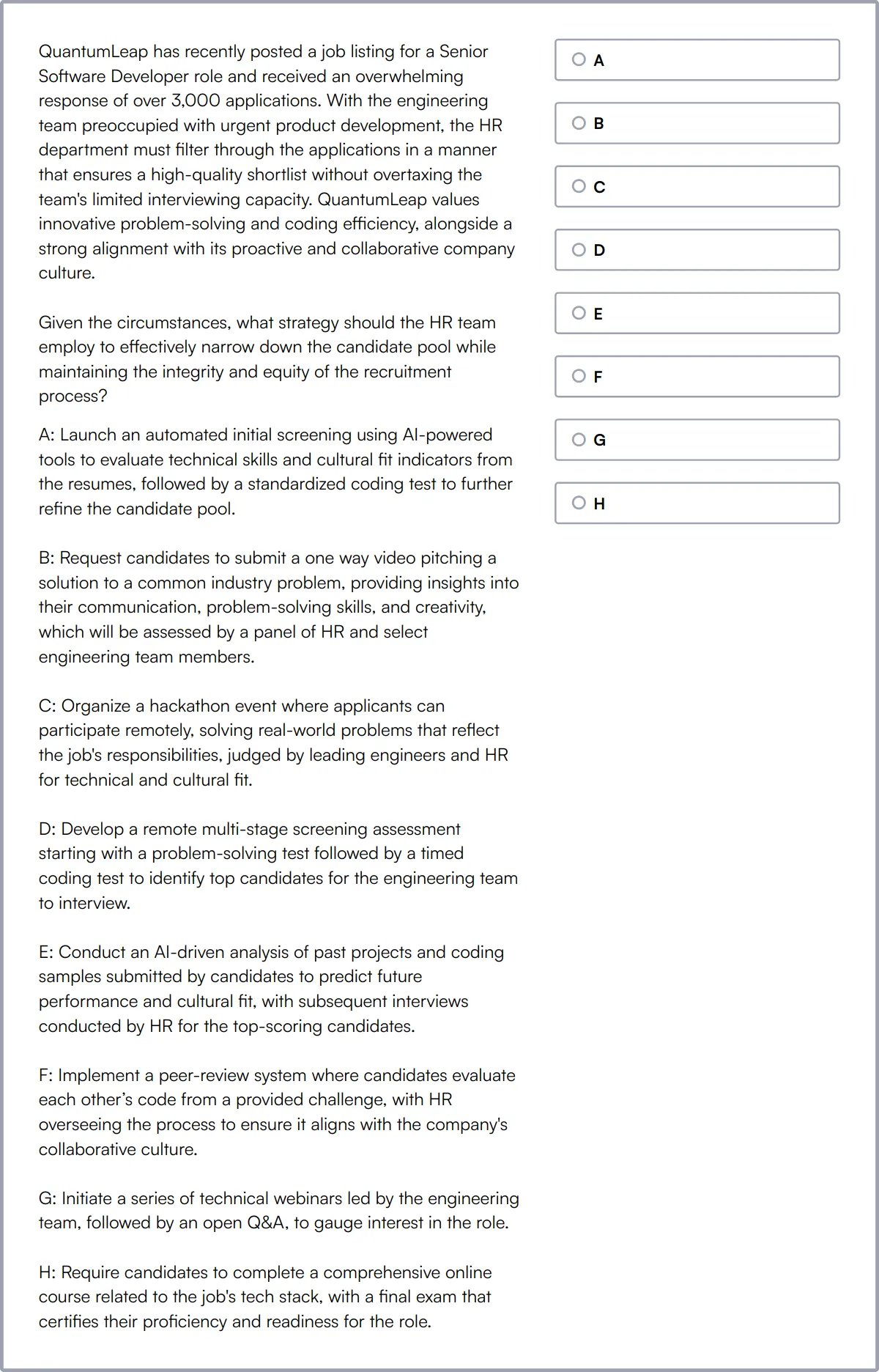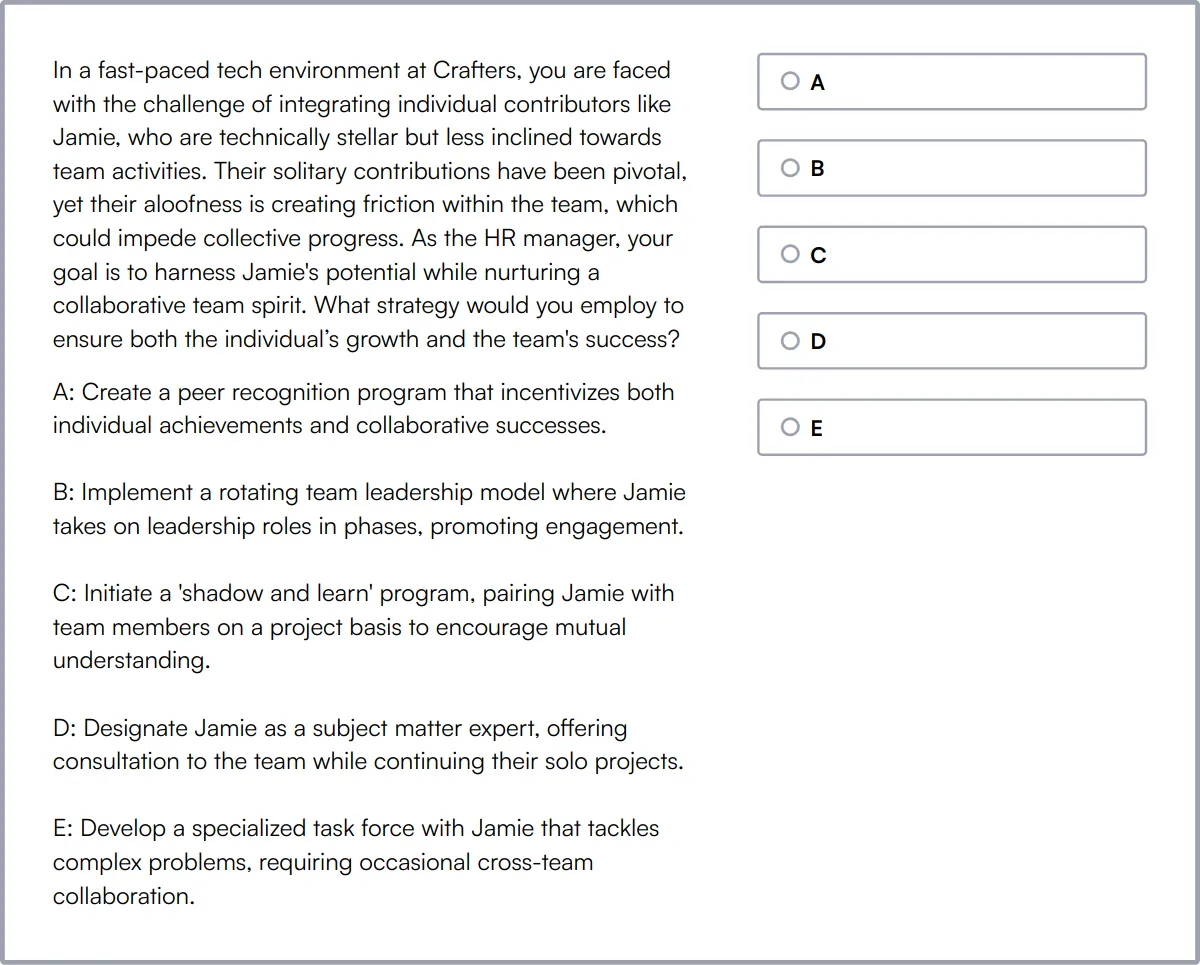The role of an HR Director is fundamental in shaping the culture and workforce dynamics of an organization. They play a key role in developing strategies that recruit, retain, and develop talent effectively.
Key skills for an HR Director include strong leadership, strategic thinking, and effective communication. Additionally, they must be adept at conflict resolution and possess a deep understanding of employment law.
Candidates can write these abilities in their resumes, but you can’t verify them without on-the-job HR Director skill tests.
In this post, we will explore 9 essential HR Director skills, 10 secondary skills and how to assess them so you can make informed hiring decisions.
Table of contents
9 fundamental HR Director skills and traits
The best skills for HR Directors include Talent Acquisition, Employee Relations, Performance Management, Compensation and Benefits, HR Compliance, Organizational Development, Data-Driven Decision Making, Conflict Resolution and Strategic Planning.
Let’s dive into the details by examining the 9 essential skills of a HR Director.

Talent Acquisition
An HR Director must excel in talent acquisition to identify and attract top talent. This involves understanding the company's needs, creating effective job descriptions, and utilizing various recruitment channels to find the best candidates.
For more insights, check out our guide to writing a Talent Acquisition Specialist Job Description.
Employee Relations
Managing employee relations is key for an HR Director. This includes addressing employee grievances, fostering a positive work environment, and ensuring compliance with labor laws to maintain a harmonious workplace.
Performance Management
Performance management is crucial for tracking and improving employee performance. An HR Director needs to implement effective appraisal systems, provide constructive feedback, and develop performance improvement plans.
Compensation and Benefits
Designing and managing compensation and benefits packages is a core responsibility. This involves ensuring competitive salaries, comprehensive benefits, and aligning these with the company's budget and strategic goals.
HR Compliance
HR compliance ensures that the company adheres to all relevant labor laws and regulations. The HR Director must stay updated on legal changes and implement policies to mitigate risks and avoid legal issues.
Organizational Development
Organizational development focuses on improving the company's effectiveness. This includes planning and implementing training programs, succession planning, and fostering a culture of continuous improvement.
Data-Driven Decision Making
Using data to inform HR decisions is essential. An HR Director should be proficient in HR analytics to track key metrics, identify trends, and make informed decisions that drive organizational success.
Check out our guide for a comprehensive list of interview questions.
Conflict Resolution
Conflict resolution skills are necessary to address and resolve workplace disputes. An HR Director must mediate conflicts, facilitate discussions, and implement solutions that maintain a positive work environment.
Strategic Planning
Strategic planning involves aligning HR initiatives with the company's long-term goals. The HR Director must develop and execute HR strategies that support business objectives and drive growth.
For more insights, check out our guide to writing a Hr Director Job Description.
10 secondary HR Director skills and traits
The best skills for HR Directors include Onboarding, HR Technology, Diversity and Inclusion, Employee Engagement, Training and Development, Succession Planning, Change Management, Workforce Planning, Employee Wellness and HR Metrics.
Let’s dive into the details by examining the 10 secondary skills of a HR Director.

Onboarding
Effective onboarding ensures new hires are integrated smoothly into the company. This includes orientation programs, training sessions, and providing resources to help new employees acclimate quickly.
HR Technology
Proficiency in HR technology is important for streamlining HR processes. This includes using HR software for payroll, benefits administration, and employee management systems.
Diversity and Inclusion
Promoting diversity and inclusion is vital for a healthy workplace. The HR Director should implement policies and programs that foster an inclusive environment and ensure equal opportunities for all employees.
Employee Engagement
Employee engagement focuses on keeping employees motivated and committed. This involves conducting surveys, organizing team-building activities, and implementing initiatives that boost morale.
Training and Development
Training and development are key for employee growth. The HR Director should identify skill gaps, create training programs, and provide opportunities for professional development.
Succession Planning
Succession planning ensures the company is prepared for future leadership needs. This involves identifying potential leaders, providing them with development opportunities, and creating a pipeline of talent.
Change Management
Change management skills help navigate organizational changes. The HR Director must plan and implement change initiatives, communicate effectively, and support employees through transitions.
Workforce Planning
Workforce planning involves forecasting future staffing needs. The HR Director should analyze workforce data, predict trends, and develop strategies to meet the company's future talent requirements.
Employee Wellness
Employee wellness programs promote a healthy work-life balance. The HR Director should implement initiatives that support physical and mental well-being, such as wellness programs and flexible work arrangements.
HR Metrics
Understanding HR metrics is important for measuring the effectiveness of HR initiatives. The HR Director should track key performance indicators and use this data to improve HR strategies.
How to assess HR Director skills and traits
Assessing the skills and traits of an HR Director is a nuanced process that requires more than just a glance at their resume. While their experience might outline their journey, it doesn't fully capture their ability to handle the complex responsibilities of the role.
HR Directors play a critical role in shaping the workforce of a company. They need to excel in various areas such as Talent Acquisition, Employee Relations, and Strategic Planning. To truly understand if a candidate is fit for this pivotal role, a deeper analysis through structured assessments is necessary.
Using tools like Adaface assessments can transform how you evaluate these competencies. These assessments are designed to measure not just knowledge, but also the application of skills in different scenarios, which is key for roles like HR Directors. With Adaface, companies have seen a 85% reduction in screening time, making it a smart choice for efficient hiring processes.
Let’s look at how to assess HR Director skills with these 3 talent assessments.
Talent Acquisition Test
Our Talent Acquisition Test measures a candidate's proficiency in sourcing, recruiting, and onboarding qualified individuals. It also evaluates their ability to leverage recruitment technologies and data analysis to meet organizational human capital needs.
The test assesses skills in logical reasoning, situational judgement, and various aspects of the recruitment process including interviewing, candidate screening, and job analysis.
Candidates who perform well on this test demonstrate strong capabilities in evaluating and selecting the right candidates, as well as creating effective job descriptions.

HR Test
Our HR Test evaluates a candidate's ability to tackle common workplace challenges in staffing, aligning employee behavior with business goals, and utilizing HR software to support management and staff.
This test covers a range of topics including human resource management fundamentals, critical thinking, abstract reasoning, and conflict management.
High-scoring individuals show a strong grasp of managing talent pipelines and resolving conflicts, ensuring alignment with organizational objectives.

Data Analysis Test
Our Data Analysis Test assesses a candidate's ability to handle, modify, analyze, and interpret data. It includes scenario-based MCQs to screen for experience in data analysis, business analysis, and data interpretation.
The test evaluates knowledge in data modeling, analysis using SQL, and interpreting complex data sets through charts and graphs.
Successful candidates will demonstrate proficiency in using popular data tools like Excel and have the ability to detect anomalies and extract meaningful insights from data.

Summary: The 9 key HR Director skills and how to test for them
| HR Director skill | How to assess them |
|---|---|
| 1. Talent Acquisition | Evaluate ability to identify, attract, and hire top talent effectively. |
| 2. Employee Relations | Assess skills in managing and enhancing employee interactions and satisfaction. |
| 3. Performance Management | Review capability to set, monitor, and review employee performance objectives. |
| 4. Compensation and Benefits | Check understanding of fair, competitive employee compensation and benefits structures. |
| 5. HR Compliance | Verify knowledge of and adherence to employment laws and regulations. |
| 6. Organizational Development | Assess ability to develop and implement growth-oriented organizational strategies. |
| 7. Data-Driven Decision Making | Evaluate proficiency in using data to inform and guide decisions. |
| 8. Conflict Resolution | Determine skill in resolving disputes and restoring workplace harmony. |
| 9. Strategic Planning | Assess ability to formulate and execute long-term organizational strategies. |
HR Test
HR Director skills FAQs
What are the key skills required for an HR Director?
Key skills include Talent Acquisition, Employee Relations, Performance Management, Compensation and Benefits, HR Compliance, and Organizational Development.
How can recruiters assess Talent Acquisition skills in an HR Director candidate?
Recruiters can assess Talent Acquisition skills by reviewing the candidate's experience in hiring strategies, interviewing techniques, and their success rate in filling positions.
What methods can be used to evaluate an HR Director's ability in Employee Relations?
Evaluate their experience in handling employee grievances, conflict resolution, and maintaining a positive workplace culture through past case studies or situational questions.
How important is Data-Driven Decision Making for an HR Director?
Data-Driven Decision Making is crucial for making informed HR decisions. Assess this skill by asking about their experience with HR metrics and analytics tools.
What should recruiters look for in an HR Director's experience with Diversity and Inclusion?
Look for a track record of implementing diversity initiatives, promoting inclusive policies, and measurable outcomes in previous roles.
How can an HR Director's Strategic Planning skills be assessed?
Assess their ability to align HR strategies with business goals by discussing their experience in long-term planning and successful implementation of HR initiatives.
What are effective ways to evaluate an HR Director's expertise in Compensation and Benefits?
Review their experience in designing competitive compensation packages, managing benefits programs, and ensuring compliance with regulations.
How can recruiters determine an HR Director's proficiency in HR Technology?
Ask about their familiarity with HR software, systems they have implemented, and how they leverage technology to improve HR processes.

40 min skill tests.
No trick questions.
Accurate shortlisting.
We make it easy for you to find the best candidates in your pipeline with a 40 min skills test.
Try for freeRelated posts
Free resources



